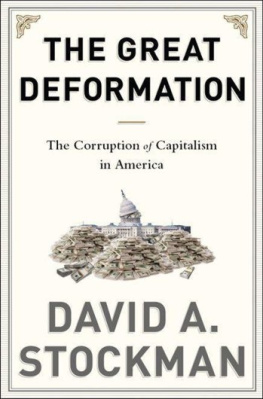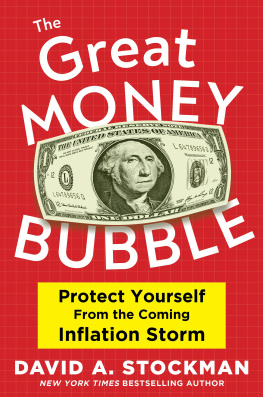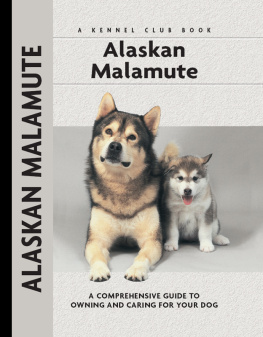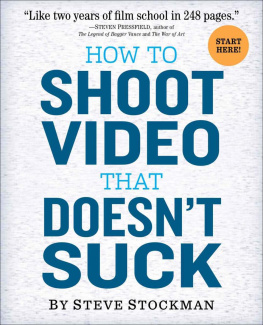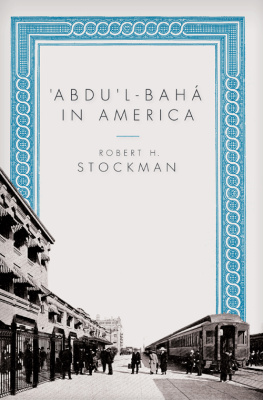David Stockman - The Great Deformation
Here you can read online David Stockman - The Great Deformation full text of the book (entire story) in english for free. Download pdf and epub, get meaning, cover and reviews about this ebook. year: 2013, publisher: PublicAffairs, genre: Detective and thriller. Description of the work, (preface) as well as reviews are available. Best literature library LitArk.com created for fans of good reading and offers a wide selection of genres:
Romance novel
Science fiction
Adventure
Detective
Science
History
Home and family
Prose
Art
Politics
Computer
Non-fiction
Religion
Business
Children
Humor
Choose a favorite category and find really read worthwhile books. Enjoy immersion in the world of imagination, feel the emotions of the characters or learn something new for yourself, make an fascinating discovery.
- Book:The Great Deformation
- Author:
- Publisher:PublicAffairs
- Genre:
- Year:2013
- Rating:3 / 5
- Favourites:Add to favourites
- Your mark:
- 60
- 1
- 2
- 3
- 4
- 5
The Great Deformation: summary, description and annotation
We offer to read an annotation, description, summary or preface (depends on what the author of the book "The Great Deformation" wrote himself). If you haven't found the necessary information about the book — write in the comments, we will try to find it.
The Great Deformation — read online for free the complete book (whole text) full work
Below is the text of the book, divided by pages. System saving the place of the last page read, allows you to conveniently read the book "The Great Deformation" online for free, without having to search again every time where you left off. Put a bookmark, and you can go to the page where you finished reading at any time.
Font size:
Interval:
Bookmark:
THE GREAT
DEFORMATION

THE GREAT
DEFORMATION
THE CORRUPTION OF
CAPITALISM IN AMERICA
DAVID A. STOCKMAN

P UBLIC A FFAIRS
New York
Copyright 2013 by David A. Stockman.
Published in the United States by PublicAffairs, a Member of the Perseus Books Group
All rights reserved.
No part of this book may be reproduced in any manner whatsoever without written permission except in the case of brief quotations embodied in critical articles and reviews. For information, address PublicAffairs, 250 West 57th Street, 15th Floor, New York, NY 10107.
PublicAffairs books are available at special discounts for bulk purchases in the U.S. by corporations, institutions, and other organizations. For more information, please contact the Special Markets Department at the Perseus Books Group, 2300 Chestnut Street, Suite 200, Philadelphia, PA 19103, call (800) 810-4145, ext. 5000, or e-mail .
Library of Congress Cataloging-in-Publication Data is available for this book.
ISBN 978-1-58648-913-7 (eBook)
Editorial production by Marra thon Production Services. www.marrathon.net
BOOK DESIGN BY JANE RAESE
Text set in 10-point Utopia
FIRST EDITION
10 9 8 7 6 5 4 3 2 1
To my daughters, Rachel and Victoria,
whose future inspired me to start this book,
and my wife, Jennifer,
whose patience and loving support
enabled me to complete it.
CONTENTS
Less than two weeks before The Great Deformation went to press, the powers that be in Washington pulled off a deal that allegedly stopped the country from going over the fiscal cliff. What they did, in fact, was to permanently add nearly $5 trillion to Federal deficits over the next ten years, ensuring that the national debt will continue to surge higher and that Washington will become strangled even more deeply in a fatal paralysis of governance.
In truth, the fiscal cliff is permanent and insurmountable. It stands at the edge of a $20 trillion abyss of deficits over the next decade. And this estimation is conservative, based on sober economic assumptions and the dug-in tax and spending positions of the two parties, both powerfully abetted by lobbies and special interests which fight for every paragraph of loophole ridden tax code and each line of a grossly bloated budget.
Fiscal cliffs as far as the eye can see are the deeply troubling outcome of the Great Deformation. They are the result of capture of the state, especially its central bank, the Federal Reserve, by crony capitalist forces deeply inimical to free markets and democracy.
Why we are mired in this virtually unsolvable problem is the reason I wrote this book. It originated in my being flabbergasted when the Republican White House in September 2008 proposed the $700 billion TARP bailout of Wall Street. When the courageous House Republicans who voted it down were forced to walk the plank a second time in betrayal of their principled stand, my sense of disbelief turned into a not-inconsiderable outrage. Likewise, I was shocked to read of the blatant deal making, bribing, and bullying of the troubled big banks being conducted out of the treasury secretarys office, as if it were the M&A department of Goldman Sachs.
Most important, I had been an amateur historian on the matter of twentieth-century fiscal and monetary history, perhaps owing to my years on Capitol Hill and in the Reagan White House when they were embroiled in these topics. In fact, prior to my Washington years, while hiding out from the draft at Harvard Divinity School in 19681970, I had taken up serious study of the New Deal under the eras great historian Frank Freidel, and had continued the inquiry ever since. So when Fed chairman Bernanke began running around Washington shouting that the Great Depression 2.0 was at hand, I smelled a rat.
Then, when the Feds fire hoses started spraying an alphabet soup of liquidity injections in every direction, and its balance sheet grew by $1.3 trillion in just thirteen weeks compared to $850 billion during its first ninety-four years, I became convinced that the Fed was flying by the seat of its pants, making it up as it went along. It was evident that its aim was to stop the hissy fit on Wall Street, and that the threat of a Great Depression 2.0 was just a cover story for a panicked spree of money printing that exceeded any other episode in recorded human history.
At length, the sweaty visage of Treasury Secretary Hank Paulson appeared on the TV screen yet again, this time announcing that Washington was writing a $13 billion check to bail out General Motors. Thats where I lost it. I had spent the two decades since I left the White House on Wall Street in the leveraged buyout business, and at that moment I was laid up on the injured reserve list because of my own fiery mishap in Detroit. I had organized, financed, and partially owned a $4 billion auto parts supplier that I had imprudently loaded up with massive amounts of debt, and which had then been crushed by the bumbling corporate bureaucrats at GM (and Chrysler) ahead of their own crash landing.
As a consequence of my Detroit experience, I was in the midst of proving to a US prosecutor that my companys bankruptcy was due to leverage and stupidity (mine), not fraud. But three years of fighting an indictment concentrates the mind, and by then I knew one thing for certain: the Detroit-based auto industry was a debt-enfeebled house of cards that had been a Wall Street playpen of deal making and LBOs for years, including my own; it needed nothing so much as a cold bath of free market house cleaning, along with a drastic rollback of the preposterous $100,000 per year cost of UAW jobs.
Paulsons claim that the auto industry would disappear and that millions of jobs would be lost I knew to be laughable. My company had forty North American plants and I had traveled the length and breadth of the auto belt and had seen dozens of worn-out, broken-down UAW-controlled auto plants in the north that were redundant, and dozens of brand new, efficient state-of-the-art plants established by foreign automakers in the southern tier of states that could readily take up the slack. Absent the auto bailouts, there would have been no car shortage or loss of jobsjust a reallocation from the north to the South based on the rules of the free market.
By the end of the Bush administration it was starkly apparent that a Republican White House had wantonly trashed all the old-time fiscal rules, and it had been done by political neophytes: Hank Paulson and his posse of eager-beaver Goldman bankers. But I had been at the center of the most intense fiscal battle of modern times during the early Reagan era and had learned something they apparently hadnt: that the Congress is made up of representatives from 435 mini-principalities and duchies, and they reason by precedent above all else. Once Wall Street, AIG, and GM were bailed out, the state would have no boundaries: the public purse would be fair game for all.
I found this alarming in view of the long ago Reagan-era battle of the budget that had ended in dismal failure. Notwithstanding decades of Republican speech making about Ronald Reagans rebuke to big government, it never happened. In the interim, Republican administrations whose mantra was smaller government only made Big Government more corpulent, so plainly by 2008 there was no fiscal headroom left at all to plunge into bailout nation.
After I left the White House in 1985 I wrote a youthful screed, The Triumph of Politics, decrying Republican hypocrisy about the evils of deficit finance. But I had also tried to accomplish something more constructive: to systematically call the roll of the spending cuts not made by Ronald Reagan, and thereby document that almost nobody was willing to challenge the core components that comprise Big Government.
Next pageFont size:
Interval:
Bookmark:
Similar books «The Great Deformation»
Look at similar books to The Great Deformation. We have selected literature similar in name and meaning in the hope of providing readers with more options to find new, interesting, not yet read works.
Discussion, reviews of the book The Great Deformation and just readers' own opinions. Leave your comments, write what you think about the work, its meaning or the main characters. Specify what exactly you liked and what you didn't like, and why you think so.

